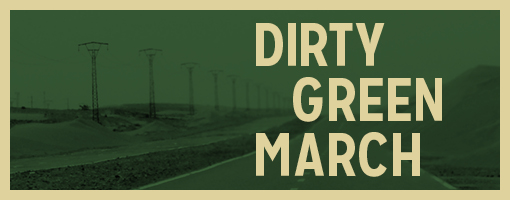
Western Sahara Resource Watch has today launched a report detailing how Morocco intends to build over 1000 MW (megawatts) of renewable energy plants in Western Sahara, a territory that Morocco partially occupies.
“These upcoming solar and wind projects, no matter how green, will be severely damaging for the people of Western Sahara. The energy produced will be used to capitalise on the resources already illegally being exploited by Morocco in Western Sahara, thereby intensifying the ongoing pillage. And by exporting the energy to the EU and to Morocco proper, the occupying power seeks to anchor its untenable claim over the territory”, stated Sara Eyckmans, coordinator of Western Sahara Resource Watch (WSRW).
Download the report “Dirty Green March” here (so far only in English).
Morocco does not produce oil and gas itself, and its government hungers for energy. The report shows that the new front for solar and wind energy production will be in the territory that the Saharawi people fled from after the Moroccan military invasion in 1975, known as the Green March.
As of today, the energy production from solar and wind sources in Western Sahara constitutes at most 5.5 percent of Morocco's total energy production from such sources. By 2020, however, the amount could be increased to an astonishing 26.4 percent, according to the new report.
Large international players in the green energy sector have so far caught the bait from the Moroccan government. Most companies mentioned in the report have not responded to questions regarding their plans. As of today, as the report is being launched, equipment for installing wind technology is being offloaded on the harbour of El Aaiun, Western Sahara.
Ever since the invasion, the Moroccan government has used the natural resources of Western Sahara as it pleases, in violation of international law. With the increased energy access, both the fisheries sector and extractive industries will be more lucrative. Through the plans, Morocco is furthermore connecting the territory it occupies to its own and Europes energy grid, a sly political move.
The legal owner of the land, the Saharawi people, has not consented to the Moroccan plans, therefore the plans are in violation of a key United Nations legal opinion on the matter. To this day, the UN consider Western Sahara to be a colony.
Contact:
Sara Eyckmans, coordinator, Western Sahara Resource Watch, Brussels, coordinator@wsrw.org
Erik Hagen, chair, Western Sahara Resource Watch, Oslo, info@vest-sahara.no
NY Check new Western Sahara poster!
“Try to Visit Western Sahara”…
The Security Council fails Western Sahara and international law
On 31 October 2025, a new resolution was adopted in the UN Security Council calling on the Saharawis to negotiate a solution that would entail their incorporation into the occupying power, Morocco.
Saharawis Demonstrate Against Trump Proposal
The United States has proposed in a meeting of the UN Security Council on Thursday that the occupied Western Sahara be incorporated into Morocco.
Skretting Turkey misled about sustainability
Dutch-Norwegian fish feed giant admits using conflict fishmeal from occupied Western Sahara. Last month, it removed a fake sustainability claim from its website.



